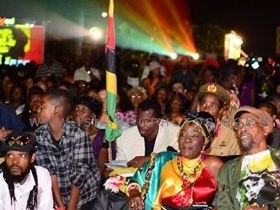Today was no ordinary stroll in the park; it was the day to witness the 'definitive story' of a man who, only decades ago, implored us to "emancipate" our minds. Show time for Bob Marley: The Definitive Story was slated for 8pm and the anticipation of every member of the audience present that evening was almost tangible. Everyone who was anyone was there; from fans to family and dignitaries alike, among them the Most Hon. Edward Seaga, Rita Marley, and Chris Blackwell, all featured in the film.
Organizers conveyed that over 100 media entities from across the globe were accredited to cover the event. The VIP area was packed to capacity so much so that high profile guests opted to sit on the floor or stand throughout the movie where there were no seats available. Marley once questioned, "Is this love, Is this love that I'm feeling?" It is without a doubt that we can say on April 19th 2012, the massive turnout with very little signs of chagrined guests was an affirmation of one love for the King.
Despite of the minor uproar by some disgruntled patrons who condemned the use of the red, green and gold Rasta colours as a carpet, the event commenced shortly after 8pm. Veteran reggae musician Michael 'Ibo' Cooper welcomed guests and introduced a spirited procession of Rastafarians who sang and chanted praises to Jah as they blessed the event. After a few words from dignitaries and an exuberant Bob Marley inspired dub poem by Majah Bless, director Kevin MacDonald finally introduced the film.
Without giving too much away, the movie begins in the hills of St. Ann where Robert Nesta Marley was born to mother Cedella and father Captain Norval. As his cousin recalls their childhood along with the help of Bob's former colleague, Bunny Wailer we learn of his humble beginnings and also gain insight on his natural inclination to 'stand out'. We are then taken to Trench town where Bob would spend the remainder of his childhood and launch his musical career. The struggles of the young Bob trying to get his footing within the music industry were all brought forward.
Macdonald soon after channelled the Bob we are more familiar with, the soul rebel, the Rasta man. As the movie progressed we see how his discovery of the Rastafarian doctrine defined his life and crafted the man we know of today. Macdonald delved deep into the more intimate details of his life, uncovering different sides of Bob, some of which many in attendance were unaware of. Beyond the spiritual musician was Bob; a father, husband, charming lover, friend, footballer, competitor, peace maker and philanthropist among other things. The narratives combined with the illustrations and clips were so ingeniously compiled that even amidst the noticeable drizzling of raindrops, members of the audience were too enthralled to even budge for shelter.
In the midst of it all a single firefly danced above their heads, as they laughed, whispered commentaries to their neighbours and then were silenced by the breath-taking elements of Bob's life. And then came the emotional ending. With the diagnosis of terminal cancer, the viewers were notably caught in their own reverie as they clenched to edges of their seats secretly hoping for a happier ending than the one they knew would come. The film concluded where it began, in the hills of St. Ann where Bob was laid to rest.
Jamaicansmusic.com gives Kevin MacDonald's MARLEY: The Definitive Story a 5 out of 5. The manner in which he captures the very essence of the life of Bob Marley is simply riveting. Anyone who has ever been touched by Bob through his music or intrigued about his life would appreciate MacDonald's work. Having watched the film and realized its invaluable contribution to the Jamaican music legacy, the only thought that lingers is; why wasn't a film of this significance released ages ago.....














 less
less
 more
more